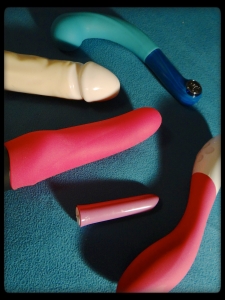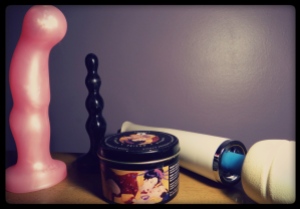2014 was my first complete year as a sex blogger, and I must say that it has been a very exciting & positive experience. I’ve learned a lot — about sex, writing, the internet, and best of all, myself. I’ve discovered a lot of amazingly talented & brilliant bloggers who inspire me on a daily basis. And I’ve made some satisfying progress towards several of my goals (including a few that seemed really far-fetched).
If you’re new to EROcentric, here’s a bit of a recap…
I published a total of 49 blog posts this year, which was very close to my original goal of one-a-week. My most popular were…
 6 BDSM Principles That Vanilla Couples Should Follow, where I exalt the basic tenets of healthy BDSM involvement as aspects that would benefit any intimate relationship.
6 BDSM Principles That Vanilla Couples Should Follow, where I exalt the basic tenets of healthy BDSM involvement as aspects that would benefit any intimate relationship.- My review for the (discontinued) We-Vibe Thrill, which was my first dual stimulation toy. Unfortunately, it continues to spend most of its life in the back of my toy drawer.
- I also received an overwhelming amount of support on Confession: My Sex Life Isn’t Perfect. It was a difficult post for me to write, but I’m really glad that it has touched other people on such a personal level.
I got really serious about body-safe sex toys this year. I tossed out my old, questionable items and started building a collection that I could trust. In just one year, I’ve added approximately 20 new toys — outgrowing our nightstands & necessitating the addition of dedicated storage-space in our bedroom. And while I didn’t feel like I had completed enough reviews to make a Best & Worst of 2014 post, I did have a couple of favorites.
- The
HitachiOriginal Magic Wand continues to be my go-to vibrator for effortless multiple orgasms. It’s perfect for when I need quick stress relief, or when I’m simply struggling to reach my peak. Plus, it makes for great back massages. - I have also fallen madly in love with Tantus. Their G-Spot “Vibrator” was the first toy that stimulated my G-spot without being uncomfortable to insert or thrust. And their Ripple (small) plug proved to me that anal play can be very pleasurable.
- Last but not least, the Shunga Massage Candle has become a bedroom essential for my partner & I. It’s such a simple item, but it’s one of my absolute favorites for sensation play.
 If you’ve been following me elsewhere on the internet, you might have noticed that I finally started an Instagram account. (Full of sex toys, cats, books, & the occasional photo of yours truly.) You may also recall that back in October, I asked my readers to consider voting for Kinkly‘s second annual list of Sex Blogger Superheroes. I was very honored (and surprised) to come in at #33 on their Top 100 list this year. This was by far my biggest accomplishment, and one that nearly had me in tears of joy!
If you’ve been following me elsewhere on the internet, you might have noticed that I finally started an Instagram account. (Full of sex toys, cats, books, & the occasional photo of yours truly.) You may also recall that back in October, I asked my readers to consider voting for Kinkly‘s second annual list of Sex Blogger Superheroes. I was very honored (and surprised) to come in at #33 on their Top 100 list this year. This was by far my biggest accomplishment, and one that nearly had me in tears of joy!
When I wasn’t working on the blog (or at my job), I tried to go on as many adventures with my partner as possible. Our biggest trip this year was to Austin, TX where I became extremely jealous of their liberal atmosphere. We visited a couple of awesome sex stores (my favorite of which was Forbidden Fruit) and witnessed an amazing performance of Bedpost Confessions, where Holly Lorka told a crowded room about discovering her pornstar vagina. It was an experience that had me laughing until I was crying, and it inspired me to be more open about my own sexual experiences.
In my academic hiatus, I’ve also discovered the amazing world of massive open online courses (MOOCs) and have become a total sex nerd. So far, I’ve completed Saylor’s Gender and Sexuality course, as well as two classes through Coursera (Contraception: Choices, Culture, & Consequences and Abortion: Quality Care & Public Health Implications). I’ve enjoyed reading articles and taking notes way too much.
What’s in store for 2015?
 Reviews are one of the easiest, most stress-free posts for me to write… and with a recent family illness, I desperately need that lack of pressure. So first and foremost, I plan to start the year by focusing on reviewing more items. (This is not to say that I will stop writing educational and advice-oriented guides — only that those posts may be delayed while I cope with other stressors.) I’ve got a few amazing toys that I really need to gush over (pun intended), and many others that need more experimentation.
Reviews are one of the easiest, most stress-free posts for me to write… and with a recent family illness, I desperately need that lack of pressure. So first and foremost, I plan to start the year by focusing on reviewing more items. (This is not to say that I will stop writing educational and advice-oriented guides — only that those posts may be delayed while I cope with other stressors.) I’ve got a few amazing toys that I really need to gush over (pun intended), and many others that need more experimentation.
As the year progresses, I look forward to working with more awesome companies, testing more products, and (as inspired by Sexologist Vixenne’s 365 Days of Orgasm) keeping track of my orgasms along the way.
One of my biggest goals for the new year is to put myself out there & become more active in the sex blogging community. In the last couple of days, I’ve taken small steps by creating accounts on both Tumblr and Pinterest. I was also lucky enough to be chosen as Kinkly’s Sex Blogger of the Month for January. In the coming months, I plan to participate in more blog memes and round-ups (specifically Toy With Me Tuesday & Elust). Who knows, I may even start utilizing my Youtube channel.
Professionally, I want to make 2015 the year of serious grad school preparation. I’m going to start working through my GRE practice tests and contacting individuals for advice. Ideally, I’d like to make a couple of campus visits this year as well. If I can schedule those visits around a sexuality conference or two, that would be especially awesome. (I’m leaning towards CatalystCon or Woodhull’s Sexual Freedom Summit at the moment.)
I want to thank all of my readers, and my fellow bloggers, for all the support you have given me. Here’s to more amazing adventures and learning experiences as we enter the new year. xox


